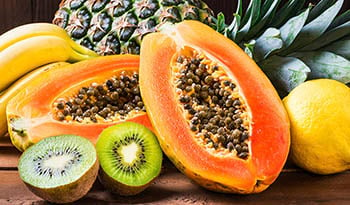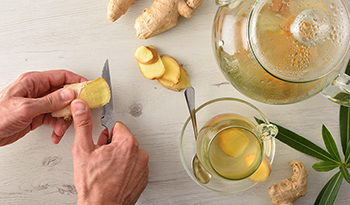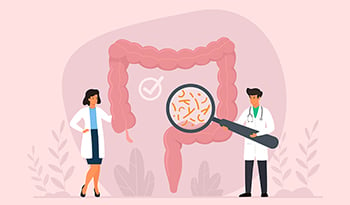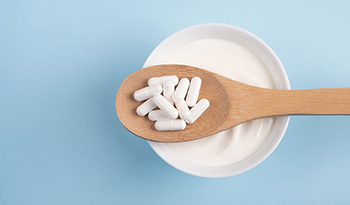Synbiotika: Vad de är + Fördelar för tarmhälsa

Probiotika vs. Prebiotika
Du har säkert hört termerna probiotiska och prebiotiska, men vad betyder de egentligen? Låt oss börja med grunderna:
- Probiotika är levande nyttiga bakterier som hjälper till att upprätthålla den naturliga balansen i tarmmikrobiota. De spelar en avgörande roll för att stödja matsmältningen, näringsupptag och immunfunktion.
- Prebiotika, å andra sidan, fungerar som mat för dessa fördelaktiga bakterier. Genom att stimulera tillväxten och aktiviteten hos tarmmikrobiota bidrar prebiotika till den allmänna tarmhälsan.
Vad är synbiotika?
Låt oss nu utforska synbiotika - en kombination av probiotika och prebiotika i en enda produkt. Vetenskapliga bevis stöder de synergistiska fördelarna med synbiotika, som kan överträffa effekterna av endera komponenten ensam. Till exempel fann en 8-veckors randomiserad kontrollerad studie publicerad i Techniques in Coloproctology (2014) att synbiotiskt tillskott signifikant förbättrade avföringskonsistensen, minskade tarmtransittiden och förbättrad tarmmikrobiotas sammansättning.1
En annan studie visade att en kombination av Bacillus coagulans och inulin minskade inflammation genom att sänka C-reaktiva proteinnivåer och öka glutationnivåerna.2 Synbiotika har också visat antiinflammatoriska effekter i djurmodeller, vilket förbättrar histologiska förändringar i inflammationsbenägna HLA-B27-råttor.3 Slutligen har in vitro-studier belyst potentialen hos synbiotika, med bevis som visar att tillskott förhindrade ett tillskott -inducerad undertryckning av immunceller i tarmen (kallade NK-celler), en fördel som inte sågs med probiotika eller prebiotika ensamma.4
Tillsammans understryker dessa fynd potentialen hos synbiotika för att förbättra tarmhälsan, minska inflammation och stödja immunfunktionen, vilket gör dem till ett kraftfullt tillskott till funktionella mat- och kosttillskottsstrategier.
Vad gör synbiotika?
Synbiotika utvecklades för att hantera de överlevnadsutmaningar som probiotika står inför. Forskning tyder på att synbiotika förbättrar överlevnaden och koloniseringen av probiotiska bakterier under deras transitering genom övre mag-tarmkanalen genom att selektivt stimulera tillväxten eller aktivera metabolismen av hälsofrämjande probiotiska bakterier.5 Dessutom kan synbiotika främja effektivare kolonisering i tjocktarmen och stimulera tillväxten av både probiotika och kommensala bakterier, vilket hjälper till att upprätthålla tarmhomeostas och allmän hälsa.6
Vem drar nytta av synbiotika?
Oavsett om du är en idrottsman, fitnessentusiast eller helt enkelt någon som vill förbättra matsmältningshälsan, kan Synbiotics hjälpa till med följande:
- Förbättra mångfalden av tarmmikrobiota.
- Främja bättre näringsupptag.
- Minska gastrointestinalt obehag.
- Förbättra immunfunktionen.
- Förbättra atletisk återhämtning och prestanda.
Slutliga tankar
Ny forskning tyder på att kombinationen av prebiotika och probiotika som ett synbiotikum förstärker deras fördelar.
Referenser:
- Bazzocchi, G., Giovannini, T., Giussani, C., Brigidi, P. och Turroni, S. (2014). Effekt av ett nytt synbiotiskt tillskott på symtom, avföringskonsistens, tarmtransittid och tarmmikrobiota hos patienter med svår funktionell förstoppning: en pilot randomiserad dubbelblind, kontrollerad studie. Tekniker inom koloproktologi, 18 (10), 945—953. https://doi.org/10.1007/s10151-014-1201-5
- Panda, Arun & Rao, Savaram & Raju, MV LN & Sharma, Sita. (2006). Kosttillskott av Lactobacillus Sporogenes på prestanda och serumbiokemisk-lipidprofil för slaktkycklingar. Tidskrift för fjäderfävetenskap - J POULT SCI. 43. 235-240. 10.2141/jpsa.43.235.
- Saulnier, DM, Spinler, JK, Gibson, GR, & Versalovic, J. (2009). Mekanismer för probios och prebios: överväganden för förbättrade funktionella livsmedel. Aktuellt yttrande inom bioteknik, 20 (2), 135—141. https://doi.org/10.1016/j.copbio.2009.01.002
- Fotiadis, C.I., Stoidis, C.N., Spyropoulos, BG, & Zografos, E.D. (2008). Rollen av probiotika, prebiotika och synbiotika vid kemoprevention för kolorektal cancer. Världsjournal för gastroenterologi, 14 (42), 6453—6457. https://doi.org/10.3748/wjg.14.6453
- de Vrese, M. och Schrezenmeir, J. (2008). Probiotika, prebiotika och synbiotika. Framsteg inom biokemisk teknik/bioteknik, 111, 1—66. https://doi.org/10.1007/10_2008_097
- Peña A.S. (2007). Tarmflora, probióticos, prebióticos, simbióticos y alimentos novedosos [Tarmflora, probiotika, prebiotika, symbiotika och nya livsmedel]. Spansk tidskrift om matsmältningssjukdomar, 99 (11), 653—658. https://doi.org/10.4321/s1130-01082007001100006
- Whelan, K., Martin, L.D., Staudacher, H.M., & Lomer, MCE (2018). Den låga FODMAP-dieten vid hantering av irritabelt tarmsyndrom: en evidensbaserad granskning av FODMAP-begränsning, återintroduktion och personalisering i klinisk praxis. Tidskrift för mänsklig näring och dietetik: den officiella tidningen för British Dietetic Association, 31 (2), 239—255. https://doi.org/10.1111/jhn.12530
ANSVARSFRISKRIVNING:Välmåendeguiden har inte för avsikt att tillhandahålla diagnos...
















































































 Innehållsförteckning
Innehållsförteckning














